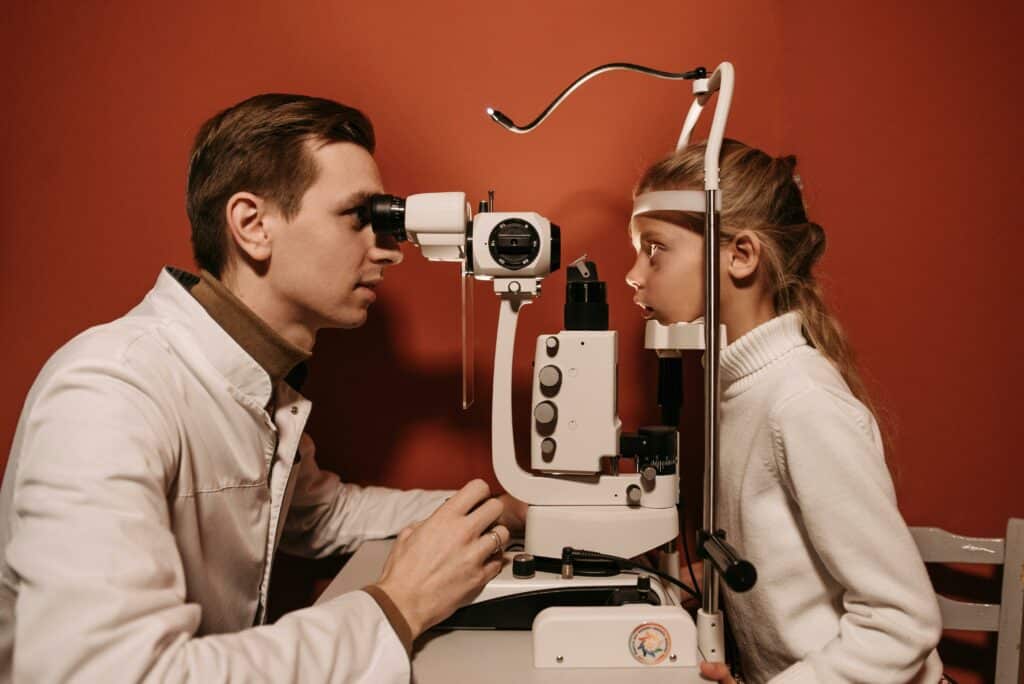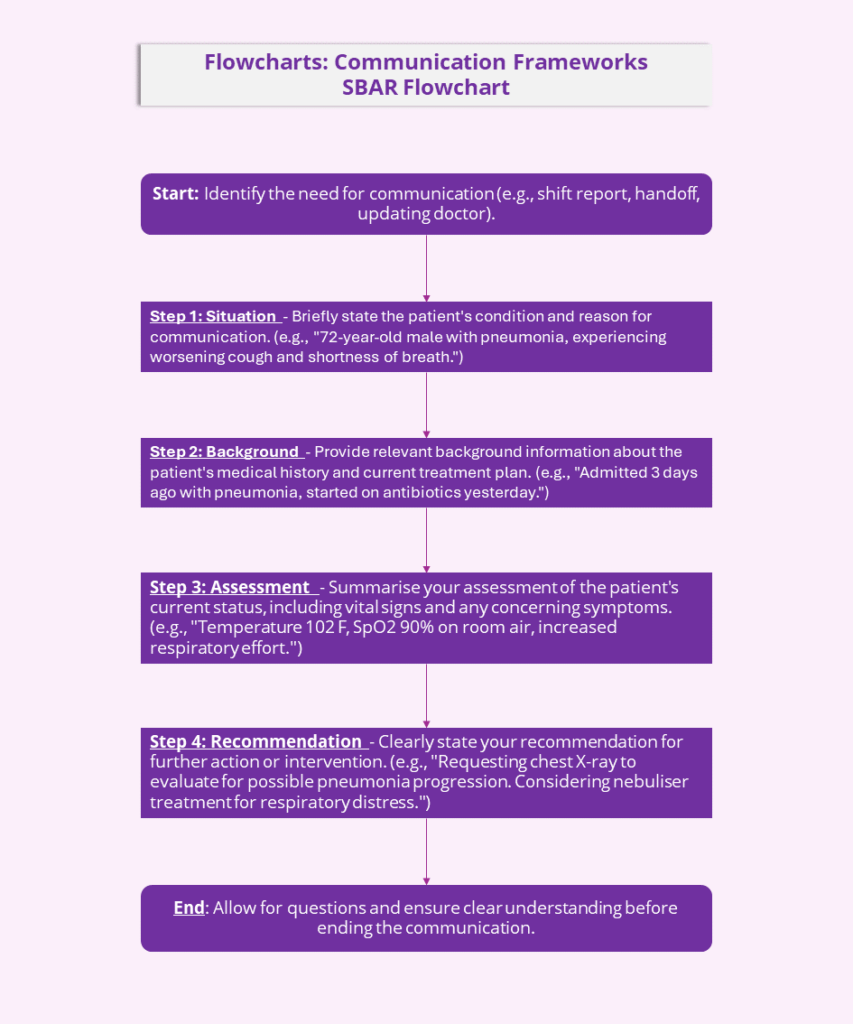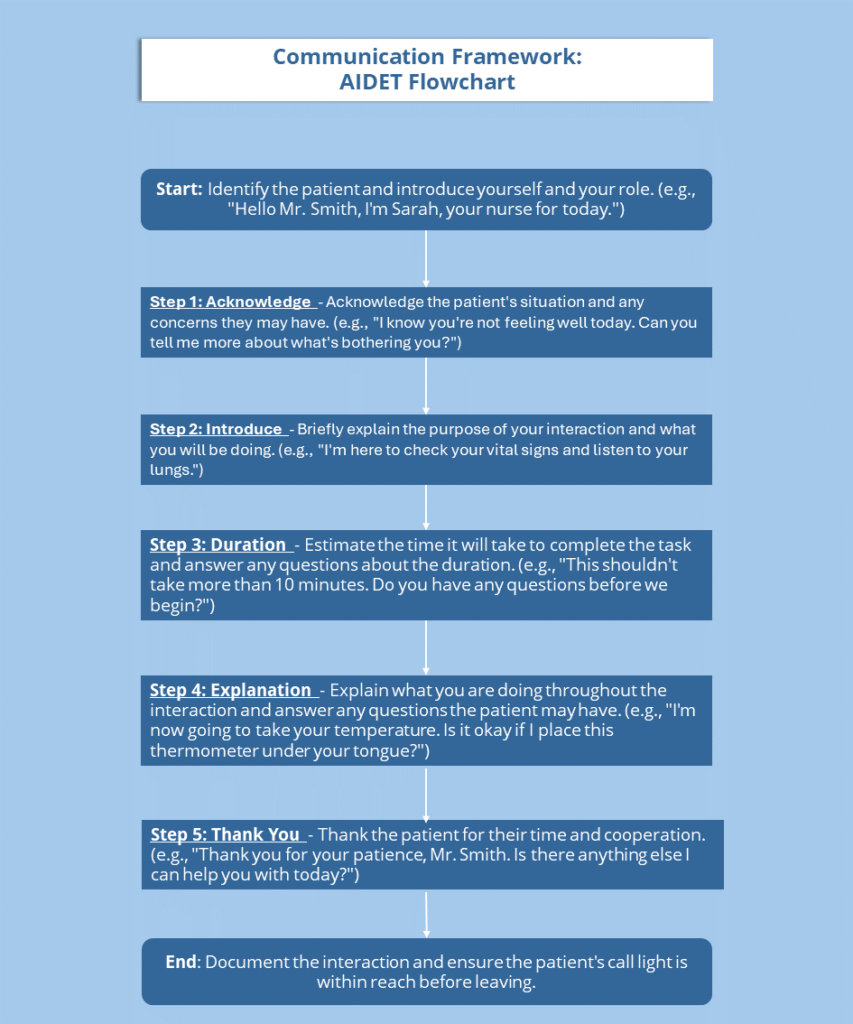Mastering Effective Communication in Nursing: Key Skills to Enhance Patient Care
Author: Lawore Olufemi
Digital Sales Optimiser For Caring For Care,
Writes on effective communication in nursing
In healthcare both clinical and nonclinical practice, communicating effectively is not just nice to have—it’s really important for giving patients good care. What you say and how you say it matters.
This is why good communication is important to avoid unintended outcomes.
Effective communication in nursing means listening carefully, understanding how people feel, being clear, being sensitive to different cultures, and speaking up when you need to.
It is the base for trust, understanding, and making sure patients get better.
Some Nurses have had sad experiences with communication because of their job. They talk with patients from lots of different places, sometimes when things are tough.
They work with different teams, deal with complicated rules, and do lots of things at once. With all this going on, it can be tough to keep communicating clearly, kindly, and with respect.
But it is really important to make sure patients are okay and everything runs smoothly in healthcare.
By communicating better, nurses can make patients happier, lower the chance of mistakes, work better with other nurses, and help make healthcare better overall.
This article will look at the main skills and useful skills that nurses can use to be better at talking, focusing on making patients the most important thing by caring about how they feel, understanding them, and building trust.
Summary:
As nurses, your words and how you talk can change people’s lives. Take on the challenge, make these important skills a priority, and always try to make your way of talking better.
By doing this, you’ll not only make the care you give better but also help make healthcare a place where caring about patients is really important and helps them get healthier.
Table of contents

I. What is Effective Communication in Nursing?
Effective communication in nursing means nurses can share information, ideas, and feelings with patients, families, and other nurses in a clear, short, and caring way.
This helps give patients the best care and make sure healthcare ends well.
Good and clear communication in nursing is super important because it builds trust between patients and nurses.
It also makes them follow their treatment plans better, avoids mistakes, helps nurses work together, and ensures patients are happier with their care, resulting in better outcomes.
Effective communication skills in nursing practice mean being able to share important information, needs, feelings, and plans clearly and kindly.
This includes talking, writing, listening, and understanding without judgment. This helps build trust between nurses and patients, making education, safety, respectful care, health, and good results possible.
Important nursing skills for better communication include:
- Active listening,
- Understanding different cultures,
- Working well in a team,
- Explaining things clearly,
- Being kind,
- Asking good questions,
- Giving helpful feedback,
- Offering support,
- Good record keeping,
- Noticing nonverbal signals,
- Speaking up for patients, and
- helping people understand health info in simple words.
These proven people skills help nurses:
- Understand patients better,
- Prevent mistakes,
- Give care that looks at the whole person,
- Help during tough times,
- Make sure patients follow advice, and even save lives.

Why is effective communication important in healthcare?
1. Helping Patients Better:
A. Getting clear information: Good communication helps nurses get the right details from patients about symptoms, medical history, and worries. This is important for making good decisions about care and treatment.
B. Making sure patients do what they’re supposed to: Effective communication helps patients understand their sickness, treatment plans, and how to take their medicine, so they do what they’re supposed to for better results.
C. Making fewer mistakes: If people don’t talk clearly, mistakes can happen with medicine, treatment, and care. Good communication helps stop these mistakes.
D. Making patients happier: When patients feel like nurses listen, understand, and include them in decisions about their care, they’re more likely to be happy with their healthcare.
E. Building trust: Good communication helps nurses build trust and get along well with patients, making it easier to talk openly and make decisions together.
F. Helping with worries: Talking clearly helps nurses understand and help with what patients are worried or scared about, making them feel better and less stressed.
G. Giving patients more power: Good communication lets patients be more involved in decisions about their care, so they feel more in control.
Helpful Post: How Nurses Can Provide Emotional Support To Patients and Family
2. Better connections and trust:
A. Building Relationship: Talking well helps nurses and care workers make friends with patients, building trust and a feeling of being a team in their care journey.
B. Managing patient worries: Talking clearly lets nurses and care workers deal with what makes patients worried or afraid, being understanding and reducing stress.
C. Giving power to patients: Talking well lets patients take an active part in their care choices, giving them a feeling of control and freedom of choice.
3. Working together as a team:
A. Communication between nurses, doctors, and other health workers is important to plan care, in making sure care will keep going on well, and in stopping problems or misunderstandings.
B. Working with patients’ families and caregivers: Talking clearly with families and caregivers lets them know what’s happening, gets them involved, and gives support in the patient’s care journey.

Communication Style in Nursing
Communication style in nursing refers to the way nurses interact with patients, families, and other healthcare professionals.
It includes both verbal and nonverbal communication, and is really important in making friends, giving good care, and making sure patients get better.
Nurses’ communication style is all about how they interact with patients, families, and other healthcare workers. It’s a two-way street that involves speaking clearly and listening attentively.
Good communication style in nursing involves:
- Actively listen: Pay attention, ask questions, and show understanding.
- Be empathetic: Acknowledge patients’ feelings and create a safe space for them to talk.
- Speak clearly: Avoid jargon, use simple terms, and check for understanding.
- Respect cultures: Adapt your approach to different backgrounds and beliefs.
- Be assertive: Support patients and speak up about worries with confidence.
Difference Between Effective and Ineffective Communication
| Communication Style | Effective Communication | Ineffective Communication |
|---|---|---|
| Listening | Actively listens, asks clarifying questions, uses silence appropriately. | Appears distracted, interrupts frequently, doesn’t ask clarifying questions. |
| Verbal Communication | Uses clear, concise language, avoids medical jargon, explains things simply. | Uses complex medical jargon, talks too fast, doesn’t explain things clearly. |
| Nonverbal Communication | Maintains eye contact, uses open body language, nods to show understanding. | Avoids eye contact, has crossed arms, seems impatient or dismissive. |
| Empathy | Shows concern for patient’s feelings, validates their emotions. | Appears insensitive, dismissive of patient’s concerns. |
| Cultural Sensitivity | Tailors communication style to patient’s cultural background, uses interpreters when needed. | Makes assumptions about patient’s culture, uses insensitive language. |
| Clarity and Conciseness | Uses simple language, checks for understanding, repeats information if needed. | Uses complex language, doesn’t check for understanding, rushes through information. |
| Addressing Concerns | Encourages patients to ask questions, addresses concerns directly. | Avoids difficult conversations, dismisses patient’s concerns. |
| Teamwork | Collaborates effectively with other healthcare professionals, communicates information clearly. | Withholds information, talks negatively about colleagues, creates conflict within the team. |
Learn How To Teach and Communicate Well
Trainers train more people, making learning cheaper and reaching everyone.

II. Core Skills for Effective Communication:
1. Active Listening:
Active listening is a basic skill that helps nurses really understand and react to what patients are saying, needing, and feeling.
Important ways to listen well include repeating back what the patient said, asking questions that make them say more, and watching their body language and how they talk.
By active listening or call it mindful listening, nurses can show they really care, build a good connection, and get important info to give better, more personal care.
Example of using active listening skills:
- When a patient is describing their symptoms, the nurse repeats back what the patient has said to confirm understanding (“So you’re saying you’ve had a persistent cough for the past few days and are feeling short of breath, is that correct?”).
- The nurse maintains eye contact, nods, and uses open body language to show they are engaged and attentive.
- The nurse asks open-ended questions to encourage the patient to give details (“Can you tell me more about how this cough has been affecting your daily activities?”).
2. Empathy and Emotional Intelligence:
Nursing needs nurses to be really good at understanding how people feel. Nurses need to know how to deal with patients who might feel scared, worried, upset, or sad.
Getting better at empathy—knowing and feeling what others feel—is super important for making patients trust you and giving them emotional support.
By showing understanding, nurses can make a place where patients feel listened to, respected, and looked after.
Three examples showing how to use this skill:
- When a patient looks upset and scared about an upcoming surgery, the nurse says, “I can tell you’re really worried and scared about this surgery. It’s totally okay to feel that way.”
- If a patient talks about feeling sad over losing someone, the nurse says, “I’m really sorry for your loss. This must be a really hard time for you and your family.”
- When a patient seems upset without saying anything, like by moving around a lot or crying, the nurse notices and comforts them with kindness and support.
3. Clarity and Conciseness:
Good and effective Communication in nursing means explaining complex medical terms in an easy and short way. This could also involve explaining using charts and drawings. The goal is to make the patient, family and fellow workers understand what they need to know.
Nurses should use simple words, not use difficult words that might confuse patients, and talk at a level that patients can understand.
This means checking if the patient gets it and changing how you talk if needed.
By talking clearly, nurses can make sure patients really understand what is going on with their health, what they need to do, and how to take care of themselves, which can help them get better and have better outcomes overall.
Three examples to showing nurses how to explain better:
- When talking about a new medicine routine, the nurse uses easy words and doesn’t use hard medical words: “Take this medicine once a day at night, and it’s better to have it with food.”
- The nurse makes difficult medical terms easy to understand by breaking it down into simple steps or making a list.
- After explaining what to do, the nurse asks the patient to say back what they understood to make sure they got it right.
Products: Communication Online Training – CPD Approved – 100+ Languages
4. Respecting Cultures:
Nurses meet patients from lots of different cultures in healthcare today.
Each culture has its own beliefs, values, and ways of talking.
Being sensitive to culture means respecting and valuing these differences, and changing how you talk to match the patient’s culture.
This might mean changing how you act, talking about specific cultural beliefs or worries, or getting family members or cultural helpers to help understand.
Three examples to show nurses on ways to respect cultures:
- When a patient from another culture worries about a treatment because of their religion, the nurse listens and respects their worries. They might suggest other choices or get someone who knows about their culture to help them understand.
- The nurse changes how they talk, like using very polite words or not doing certain things, to match how the patient’s culture does things.
- If a patient doesn’t speak much English, the nurse gets a professional interpreter to make sure they understand each other well.
5. Speaking Up and Fixing Problems:
Effective communication in nursing also means being able to speak up and fix problems when they happen.
Nurses need to stand up for what patients need, talk about worries clearly and confidently, and fix arguments or problems with other nurses in a nice and helpful way.
By getting better at speaking up and fixing problems, nurses can make sure people listen to them, make sure patients stay safe, and keep working well with other healthcare people.
Three Examples on how to speak up and mend problems:
- In a meeting with the team, a nurse talks nicely about their worry with a treatment plan and suggests a different way to keep patients safe.
- If nurses do not agree about something, the nurse listens to both sides, understands each, and talks about fixing the problem so patients are okay.
- If a patient or family member gets upset or argues, the nurse stays calm and polite, tells them clearly what is okay and what’s not, and tries to make things calmer by listening and caring.
6. Teamwork:
Nurses should be good at talking with other healthcare workers, like doctors, therapists, and social workers, to plan patient care and make sure moving between different healthcare places goes smoothly.
Effective communication is important to build and promote team’s progress and success. Nurses work with doctors, therapists, and social workers to make sure patients get the best care possible.
By effective communication and working together, they make sure everything goes smoothly and patients are happy and healthy.
Examples to show this:
- The nurse leaving makes sure the nurse coming knows about each patient. They both ask questions to make the change smooth.
- The nurse, social worker, and case manager talk often to plan when patients can leave and what care they need after.
- The nurse, therapist, and dietitian work together to teach patients everything they need to know, using each person’s knowledge.
- The nurse tells the doctor about a possible mistake with medicine. They work together to check and fix the treatment plan.
These examples used show how nurses can use these important talking skills in different situations to:
- make good connections,
- give caring help,
- make sure everyone understands each other, and
- deal with hard times well.

III. Communication Across Different Scenarios:
1. With Patients:
One of the hardest parts of nursing is talking about bad news or having tough talks with patients.
This might mean talking about a serious illness, problems with treatment, or what to do at the end of life.
Nurses should talk about these things by caring about how patients feel, being gentle, and being ready to listen.
Giving info in an easy and caring way, giving patients time to understand and ask questions, and giving emotional support can help deal with these hard situations better.
a. Teaching Patients About Their Care: Nurses are important in teaching patients about their health problems, treatment plans, and what they need to do to take care of themselves.
Good communication in this situation means checking what the patient already knows, explaining things in a way they can understand, using pictures or writing when it helps, and asking them to ask questions and give feedback.
By making sure education focuses on the patient, nurses can help them understand better, do what they need to do, and be healthier overall.
b. Connecting with Patients: Making a good connection and making patients trust you is really important for talking well and giving good care.
Nurses can build this connection by caring about how patients feel, listening carefully, and really caring about their health.
Using friendly body language, looking at them when you talk, and talking in a nice, friendly way can also help make them feel welcome.
By making patients trust you, they’re more likely to tell you important things, do what you say, and take care of themselves.
People Also Read This: Gaining Healthcare and Nursing Competence
2. With Colleagues:
a. Handoffs and Shift Reports: Giving clear and short messages is super important when nurses give over information and care jobs to other healthcare people during handoffs and shift reports.
Using structured ways of talking, like SBAR (which means Situation, Background, Assessment, Recommendation), can make sure all the important info gets passed on quickly and correctly.
Also, asking questions, making things clearer, and really listening to what the incoming nurse is worried about can help make sure things keep going well and care stays the same.
b. Working Together with Different Teams: Nurses usually work with lots of different healthcare people, like doctors, therapists, social workers, and others.
Good talking in this situation means respecting what everyone does, talking clearly and shortly, and making sure everyone understands and decides together.
Nurses can help by asking others what they think, saying the main things, and making sure care plans for patients are all set up and agreed on.
c. Dealing with Problems and Fixing Arguments: It is normal to have arguments and disagreements in healthcare teams, but effective communication can help solve them.
Nurses should feel okay to say what they are worried about in a nice way, listen to what others think, and work together to fix things so patients stay safe and okay.
Using ways to fix arguments, like listening carefully, understanding different points of view, and focusing on what everyone wants to do, can help deal with worries and keep everyone working well together.
3. With Families and Caregivers:
a. Involving Families in the Care Plan: Family and caregivers are really important in helping patients get better and stay well.
Effective communication in nursing means making sure families are part of planning care, giving them updates on how the patient is doing, and asking what they think.
Nurses should make families feel like they are important, respected, and valued as partners in taking care of the patient.
b. Managing Tough Times: Sometimes, families and how they get along can make care harder, causing arguments or tough situations.
Nurses should be ready to deal with these times by being gentle, polite, and focusing on what’s best for the patient.
This might mean helping sort out arguments between family, dealing with differences in culture or language, or gently making sure the patient’s private stuff stays private and they stay safe.
Note: We have a on-site group training for nurses in effective communication training, check it out

IV. Practical Tools and Tips:
a. Communication Frameworks: Using organised ways of talking, like SBAR (which means Situation, Background, Assessment, Recommendation), can help nurses tell information in a good way.
SBAR gives a standard way to communicate about how patients are doing, making it easy to understand during handoffs, shift reports, and talks with other healthcare people.
Other ways of effective communication, like AIDET (which means Acknowledge, Introduce, Duration, Explanation, Thank You), can help nurses talk with patients and make a good connection.
b. Using Technology Well: Technology is becoming more and more important in talking in healthcare.
Nurses should use things like electronic health records (EHRs), websites for patients, and safe messaging apps to share information quickly and correctly.
But it is important to not just use technology and forget about talking face-to-face. Technology should help make talking better, not replace talking with people.
c. Dealing with Stress and Limited Time: Nursing is a hard job, and not having enough time and feeling stressed can make talking harder.
Nurses should find ways to handle their work, do the most important things first, and take breaks to rest.
Doing things to manage stress, like deep breathing or being mindful, can help stay calm and focused, which makes talking better with patients and other nurses.
d. Thinking About How to Get Better: Good communication is something nurses always need to work on.
Nurses should think about how they talk regularly, ask other nurses and patients for advice, and find ways to get better.
Going to classes, joining workshops, or getting help from someone more experienced can help nurses talk better and change with how health care is always changing.
SBAR and AIDET Flowcharts: Effective Communication Frameworks (CLICK TO EXPAND)
SBAR Communication Framework in Healthcare
SBAR stands for Situation, Background, Assessment, Recommendation.
The SBAR communication framework is a structured way used in healthcare to share important information between healthcare workers. The meaning of SBAR in nursing is broken down as:
- Situation: Describing what’s happening right now.
- Background: Giving important background information.
- Assessment: Saying what you think is going on.
- Recommendation: Making suggestions about what to do.
This framework helps make sure communication is clear and simple, reducing mistakes and problems in patient care. See the flowchart below.

AIBET Framework
The AIBET Framework is another communication tool used in healthcare. AIDET in nursing is a way for nurses to talk better with patients.
It stands for:
- Assessment: Look at the situation or problem.
- Identification: Find the main things that matter.
- Background: Tell important information about what’s been happening.
- Explanation: Say what you think and what should be done.
- Time: Talk about when things need to happen.
This framework helps health workers such as nurses, doctors etc effectively communicate important information and make informed decisions about patient care.

Conclusion:
In nursing, where things are always changing and tough, effective communication isn’t just something nice to have—it’s super important for giving patients the best care possible.
By getting better at listening carefully, caring about how patients feel, talking clearly, being sensitive to different cultures, and speaking up when they need to, nurses can make patients and families trust them more.
This helps make sure everyone understands each other and works better together.
Effective communication in nursing is important in lots of situations, like telling patients hard things, working with different healthcare teams, and helping families when things are tough.
By using helpful tools and ways of talking, like communication structures, using technology, handling stress, and always thinking about how to get better, nurses can make their talking skills better and deal with the hard parts of their job with more confidence and effect.
Getting good at talking well is something nurses always need to work on. It takes time, practice, and always trying to get better.
Nurses who make these skills important can make nursing even better, by giving patients the best care, making good connections, and helping make healthcare a place where caring about others and trusting each other is important.
More Ways to Learn More:
- Workshops and talks about effective communication run by nursing groups
- Online classes and certificates in talking well in healthcare
- Getting help from someone more experienced or having a coach
- Reading books and articles about how to talk well in healthcare
Let us Help you
We’ll help you find the right course for your needs. Tell us a little bit about your situation and what you would like to achieve.
We’ll get back to you within one working day.
